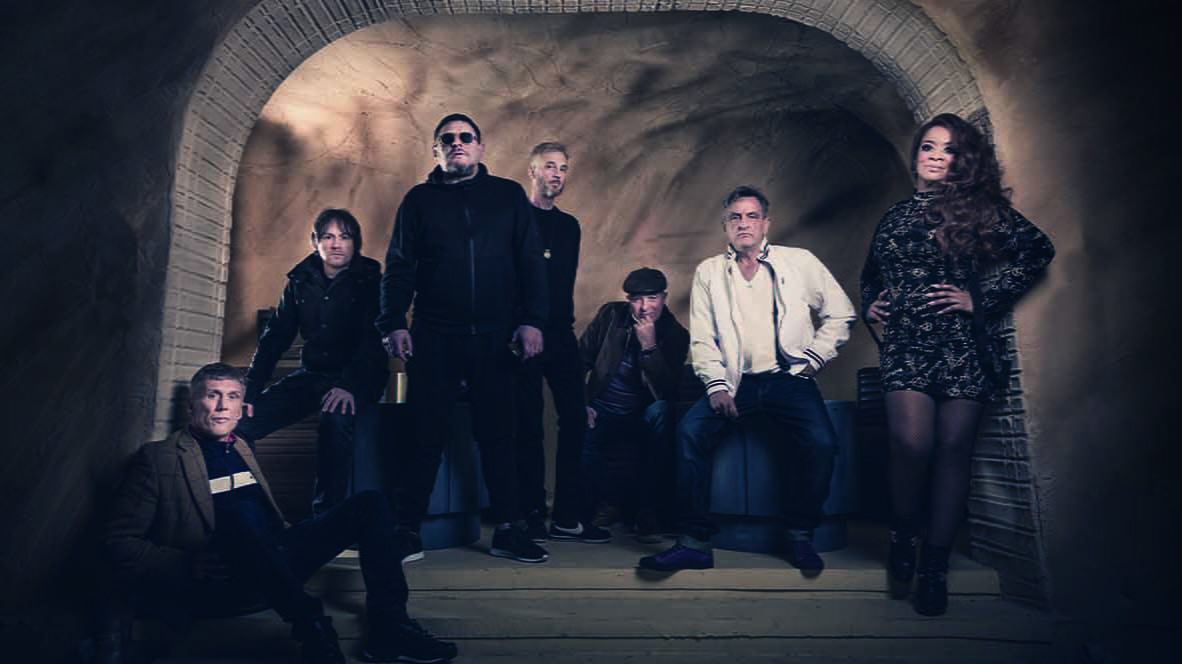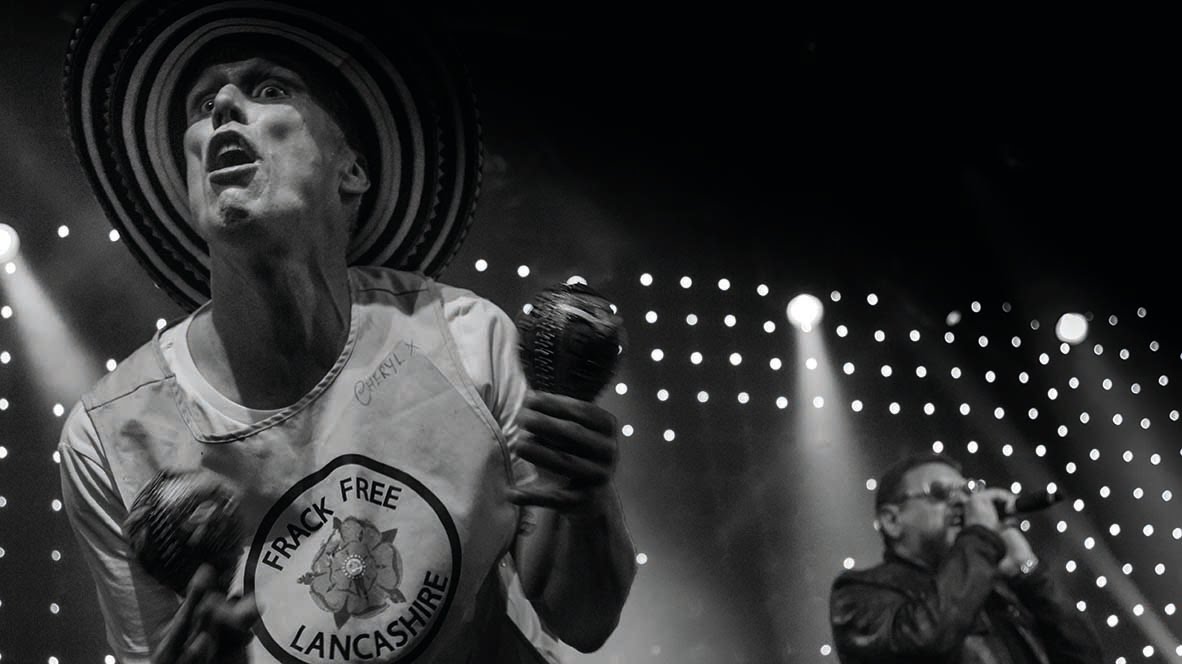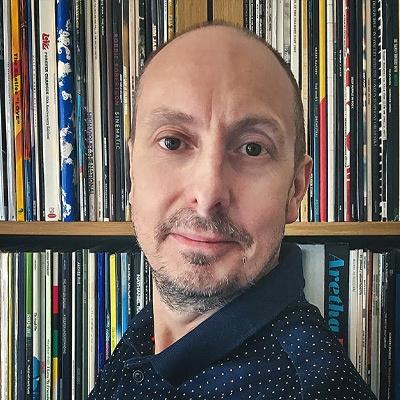
Happy Mondays interview. Pic by Paul Husband
In this Happy Mondays interview from 2017, we speak to charismatic frontman Shaun Ryder, plus fellow survivors Mark Day and Rowetta…
Every decade gets the double bill of bands it deserves. The 60s gave us The Beatles and Stones; the 70s spat out the Sex Pistols and The Clash while the 90s served up Oasis and Blur.
For the baggy generation of the late-80s, The Stone Roses and Happy Mondays positioned themselves at the forefront of a new dance rock movement that united the head, heart and feet.
Both bands were led by unconventional frontmen – the Roses had the mesmeric Ian Brown while the Mondays’ trump card was the laconic Shaun Ryder – a surrealistic double-speaking lyricist and main focal point alongside boggle-eyed talismanic dancer Bez.
Like Noel Gallagher, Ryder was happy to wear his influences on his sleeve, routinely dropping in snatches of other artists’ songs and creating smash and grab mash-ups. “When we started, kids were listening to Duran Duran, Spandau Ballet and Culture Club, but we were throwing music into our tunes from our childhood,” Shaun tells Classic Pop.
“You could say we ripped off or stole from those artists, but we saw it as a homage. I wouldn’t dream of doing some of the things now musically that I did then, just the naivety of taking a David Essex tune and sticking it in the middle of one of ours for a laugh.
Happy Mondays interview
“[Guitarist] Mark Day was the only musician among us who could really play his instrument. He was into Rainbow and Deep Purple, but was up for anything that would make his playing sound different.”
Day – now back with the band after the original line-up reunited in 2012 agrees: “I was into heavy rock. Shaun and his brother Paul invited me around to have a jam at theirs. I did have a Queen t-shirt on, which was not the thing to have in them days. They were into people like Joy Division. Anything that had guitars from the 70s, that was me all over. Then I got into Frank Zappa – I was always changing, listening and learning. Then the 80s came along and I got used to keyboards taking over from the guitar. Long guitar solos went out of the window. I had to adapt.”
Formed in 1980, it was five years before the Happy Mondays released any material. But even then, Ryder believes it was too much, too soon.
“We got to making records way too early,” he says. “I was still learning how to write songs and the lads were learning how to play.”
Signed to Factory Records, the skewed post-punk of the Forty Five EP (often incorrectly called the Delightful EP) was their first flowering, followed by debut album (deep breath) – Squirrel And G-Man Twenty Four Hour Party People Plastic Face Carnt Smile (White Out) – produced by Velvet Underground legend John Cale.
“Tony Wilson came up with the idea of using John Cale as they were friends. John did that album for £6,000. It was a favour to Tony, really,” explains Ryder.
Happy Mondays interview
Each Mondays album saw a distinct change in direction. The rough-around-the-edges funky post-punk of their debut mutated into an acclaimed follow-up Bummed a year later, which saw Joy Division producer Martin Hannett at the controls.
Dropping in references to Mick Jagger’s cult movie Performance and swiping melodies from Lennon and McCartney on Lazyitis, by now the band were fully hitting their stride. Ryder could see they were at a crossroads and needed to make commercial headway: “We’d made two great indie albums that were getting written about in the music press, but we needed to make a record that would cross over, one to make some money and get us on to Top Of The Pops.
“There was nothing bigger than being on Top Of The Pops. It was big for The Beatles, it was big for the Stones. It was the real big fucking thing.”
Day adds: “It was funny that just a couple of years earlier journalists rejected us cos we looked like hooligan scallies.”
The Madchester Rave On and Hallelujah EPs were the breakthrough releases, with the latter title track being performed on the same edition of Top Of The Pops in November 1989 that saw The Stone Roses swagger through Fools Gold.
Erasure’s Vince Clarke got involved as a remixer but it was DJ Paul Oakenfold who would prove to be the next major player in the band’s upward trajectory.
“Vince had five fucking tunes in the charts at the same time, but they all had his stamp on it,” adds Ryder. “A few really cool ‘on it’ DJs started playing the Oakenfold remixes of us instead. We heard about Paul mixing The Woodentops in with Balearic Spanish gay dance music. If we’d have been on a major label they would never had allowed someone like him to produce us.”
As leaders of the E-ed up generation, the Mondays’ melting pot of dancified indie rock made them chart stars – something they fully capitalised on with the Oakenfold and Steve Osborne-produced classic album Pills ‘n’ Thrills And Bellyaches in 1990. Another key component in their breakthrough? The inimitable co-vocalist Rowetta Satchell.
“I’d been a fan of the Mondays for years since I saw them on [Granada TV show The Other Side Of Midnight] doing a live version of Performance,” she explains. “Tony Wilson had called them the greatest band in the world and said the same thing about the Sex Pistols years before. I always wanted to be in a punk band – I’ve been a punk since I was a teenager but my voice doesn’t really lend itself to that type of music.
“I was determined to sing with them. I had to persuade them, though. Getting all the different remixers involved really changed their sound. The rock guys were all taking drugs – the summer of love was a particularly happy time in Manchester. Everybody was raving and dancing – no fighting at all.
“All of a sudden it was more soulful and dancey. I saw myself like when Gloria Jones joined Marc Bolan and T.Rex. When you hear Get It On with her vocal on it, too, it lifts the whole thing.”
Happy Mondays interview
Despite the pills and thrills alluded to in the album’s title, recording sessions were productive, smooth and relatively chaos-free. That was to come later…
“We were doing interviews for magazines like Smash Hits and you’d never have seen bands like the Mondays in there previously,” Rowetta adds. “I realised this cult band that I’d joined was becoming more commercial.”
Satchell had managed to seamlessly infiltrate what appeared on the outside like the most laddish of bands.
“I’ve always gone around with the boys so that bit was easy,” she laughs. “But they could be a bit crude – a lot of Manchester lads are. I went to a posh school, Bury Grammar. I just didn’t understand a lot of what they were talking about. They were all from Salford. Shaun would joke: ‘go on, give us a nosh’. I thought he wanted me to cook! I just told them not to treat me like a girl and put the kettle on every two minutes. They were actually more respectful than some of their girlfriends.”
The Osborne and Oakenfold partnership worked perfectly on Pill ‘n’ Thrills as Rowetta adds: “Steve – who doesn’t get a lot of attention really – was running the studio every day and Oakey would be DJing all the time. It was all done in the day when Paul wasn’t there. It was more about his ear for it all. Steve was the proper music man that did everything with us.”
The album featured the singles Step On, Loose Fit and Kinky Afro, all seminal hits. By now a major chart act who’d broken through (at least on a minor level) in the States, too, the cracks (pun intended) began to show when a follow-up was needed. Then it gets dark.
Happy Mondays interview
As Ryder’s heroin habit began to become an increasing problem, Factory’s boss Tony Wilson decided to send the Mondays to record their new album on the smack-free island of Barbados. Two things made that a major tactical error. Firstly, Ryder smashed his supply of methadone in the airport en route to the Caribbean; secondly, the island may not have provided a ready supply of heroin, but crack cocaine was rife.
Ryder, though, is quick to deny the now legendary stories that the druggy excesses during the recording of 1992’s Yes Please! ultimately led to Factory’s demise.
Read more: Making New Order’s Technique
Read more: Making The Stone Roses
“Fleetwood Mac did more fucking drugs than we did,” he argues. “Pink Floyd, Led Zeppelin – they had more fookin’ money. Those stories about us in Barbados… yes, we smoked a bit of crack. Crack in Barbados costs £2.50 an ounce. In England, it was £20 for a little stone. So, there wasn’t this large amount of money spent on anything – it’s bullshit. We didn’t ruin Factory. We went platinum.
“The thing that Factory didn’t have was a massive PR department behind it like all major labels do as that costs money. So, we made our own fucking press with the drugs stories and rave thing.
“When I hear that Tony Wilson wasn’t a good businessman, it’s bullshit. He would have put all the other fucking muppets to bed. If he was still alive today, he’d be sitting next to Simon Cowell on The X Factor.”
“We didn’t feel that much pressure at first,” Rowetta adds about the atmosphere surrounding the Yes Please! sessions. “It was only when it all went wrong in Barbados that we started to feel it. We realised there was nothing that Shaun did out there vocals-wise that could be used. When he came back, he went into rehab. I got a call asking if I could be free for six weeks – it was going to be just me and Shaun in the studio with the producers Tina [Weymouth] and Chris [Frantz].
“Shaun lost his confidence a bit but we were in a lovely manor house studio in Surrey. The worst we did was go into the kitchens to see if there was any sherry in there. But the tour that followed was really not good and the band didn’t know the songs that well.
“Previously, on a good night something like Wrote For Luck could go on for 15 or 20 minutes and we’d get the crowd on stage with us. All that seemed to have gone. Shaun started using an autocue.”
The Mondays split for the first time in 1993. For Mark Day, those final moments in the original line-up still sound traumatic: “I don’t know whether it was not being used to fame or not being told how to deal with it, but psychologically I had real problems with the band. I was always upset and miserable, thinking it was madness, that it couldn’t carry on. When we went to Barbados, it was a drain. The first day we got there I was in tears, just thinking ‘this is mental’. I woke up the first morning we were there and there was a crack dealer waiting outside…
Read more: New Order – Album By Album
“It was when we lost a potential record deal with EMI – and the only one on the table actually – when Shaun went for his infamous ‘KFC’. You could just tell everything was crumbling all around us. That old saying about ‘when the going gets tough, the tough get going’, with us it was the opposite. People just stopped talking to each other.
“I never thought about leaving the band. But everyone had their own personal problems and demons to fight against. I just couldn’t walk into another band because I had such a distinctive style.”
“Me and Bez fought to death to keep our friends and little gang together,” says Ryder. “Jealousy crept in – it was a case of the door stays open for me and Bez then it’s let go of when the rest of the band walk in. You know what, that’s how it was. We’re all older and wiser now. But the rest wanted to split up that band and cut their own noses off to spite their face.”

Happy Mondays interview: Bez and Shaun Ryder
Ryder kept hold of the band name and various incarnations resurfaced with a rotating membership. Fans were thrilled, though, when a full reunion of the original members was announced in 2012.
Keyboardist Paul Davis made the opening tour but was the first casualty of the comeback, leaving after a year: “Paul Davis can’t play keyboards,” Ryder says bluntly. “He never could. I like Paul, he’s a boyhood friend, but when we got really successful, Tony [Wilson] would take things on board that Paul would say. But Paul was an absolute fookin’ fruitcake.
“The only bullshit that Tony ever told me was to split everything equally with the writing royalties so that there wouldn’t be any arguments. And I did. I didn’t take what was mine.
“But do you know what, did it stop the arguments? Did it fuck. It’s not frustrating now, cos everyone gets a tickle in terms of the songwriting.
“It’s great that we’re all getting on and playing better than ever now, though. It’s quite difficult to talk about how it was in the past without still rubbing people up the wrong way.”
Happy Mondays interview
Rowetta, who now also appears with the Hacienda Classical touring band and has a forthcoming collaboration with Fun Lovin’ Criminals on the way, agrees that the reunited Mondays finds them older but wiser: “It’s a pleasure to be with each other and play. We remember the shows now!
“Back in the day because of the adrenaline you’d go straight to a party and be up all night drinking. You can only do it so much.”
For Mark Day, his situation was rather different. “I set my own company up selling crap for 10 years and ditched the music business. Then I applied to teach music with the local council – once they found out who I was I had to audition.
“I hadn’t played in 17 years and had to perform in front of three classically-trained people. I just about managed to scrape my way through Blackbird by The Beatles. I ended up teaching in high schools and playing in orchestras. I still do that now.
“When I got the phone call [about the reunion] I was pretty skint and my company went under. In the end, my daughter made the decision for me after she’d bumped into Shaun.
“I love it now. I haven’t looked back and enjoy it more than ever.”
Hints of a new album have surrounded the band since the 2012 reunion but to date nothing has surfaced and could be delayed by the success of the latest Black Grape album, Pop Voodoo.
Mark Day says he’d “do it tomorrow”, but Ryder hints that after the forthcoming winter tour, there will be a lengthy hiatus. “A new Mondays album is still a possibility but other than a few festivals, the band have got to go to bed for a couple of years. We’ll be promoting the Black Grape album around the world for the next two years.”
Work has been started, though, as Rowetta reveals: “I’ve still got all the ideas on my laptop. They’re great. I think Alan McGee who manages us wants an album in 2019. So as long as we’re still together, then it could still be possible.”
Busier than ever, Shaun is juggling two bands and revelling in a new-found status as being an elder statesman of indie. “After I came out of the jungle, people started calling me a national treasure. It’s better than being labelled a junkie nobhead, though, so I’ll take that any day.”
Read more: Blur – Album By Album
Follow Happy Mondays on Twitter
Classic Pop may earn commission from the links on this page, but we only feature products we think you will enjoy.


